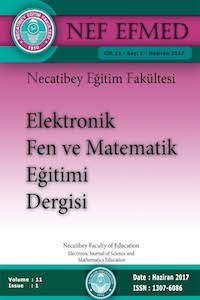Öz
The purpose of this study is to determine the effect of the discussion of the refutation texts with focus group interviews on the epistemological beliefs of the pre-service mathematics teachers after the reading of the refutation texts. The focal point of the study is the epistemological beliefs of the pre-service mathematics teachers. Experimental design with pre-test post-test control group was used in the study. The sample of the study consisted of 10 last year pre-service mathematics teachers. Unlike the control group, in the experimental group, the refutation texts were individually read and then discussed as a group with semi-structured interview questions. Data collected with instructional scenarios were analyzed using the Mann Whitney U test. According to the study results, there was a significant difference between the post-test scores of the equalized groups of instructional scenarios in favor of the experimental group. The discussion of the refutation texts with focus group interviews caused a significant differentiation in the epistemological beliefs of the teacher candidates.
Anahtar Kelimeler
Mathematics teacher training epistemological beliefs refutation texts school experience pre-service mathematics teachers
Kaynakça
- Aypay, A. (2011). Öğretme ve öğrenme anlayışları ölçeği’nin Türkiye uyarlaması ve epistomolojik inanaçlar ile öğrenme ve öğretme anlayışı arasındaki ilişkiler. Kuram ve uygulamada eğitim bilimleri, 11(1), 7-29.
- Beck, C. & Kosnik, C. (2006). Innovations in teacher education: A social constructivist approach. New York: State University of New York.
- Biçer, B., Er, H. & Özel, A. (2013). Öğretmen adaylarının epistomolojik inançları ve benimsedikleri eğitim felsefeleri arasındaki ilişki. Eğitimde kuram ve uygulama, 9(3), 229-242.
- Büyüköztürk, Ş., Çakmak, E.K., Akgün, Ö.E., Karadeniz, Ş. & Demirel, F. (2014). Bilimsel araştırma yöntemleri. Ankara: Pegem Akademi.
- Bruner, J.S. (1986). Actual minds, possible worlds. Cambridge, MA: Harvard University Press.
- Fosnot, C.T. (1996). Constructivism: Theory, perspectives and practice. New York, NY: Teachers College.
- Gill, G.G., Ashton, P.T. & Algina, J. (2004). Changing pre-service teacher’s epistemological beliefs about teaching and learning in mathematics: An intervention study. Contemporary Education Psychology, 29, 164-185.
- Guizzetti, B. J., Hynd, C. R., Skeels, S. A., &Williams, W. O. (1995). Improving high school physics texts: Student speak out. Journal of Reading, 36, 656-663.
- Guizzetti, B. J., Williams, W. O., Skeels, S. A., & Wu, S. M. (1997). Influence of text structure on learning counter-intuitive physics concept. Journal of Research in Science Teaching, 34, 700-719.
- Guizzetti, B. J. (2000). Learning counter-intuitive science concepts: what have we learned from over a decade of research? Reading and Writing Quarterly, 16, 89-98.
- Lebow, D. (1993). Constructivist values for instructional systems design: Five principles toward a new mindset. Educational Technology Research and Development, 41(3), 4-16. http://www.jstor.org/stable/30218384 27/04/2010
- Lortie, D. C. (1975). Schoolteacher: A sociological study. Chicago, IL: University of Chicago.
- National Council of Teacher of Mathematics (2000). Principles and standards for school mathematics. Reston, VA: Author.
- Schunk, D.H (2012). Learning theories: An educational perspective. Boston, MA: Pearson.
- Vygotsky, L.S. (1978). Mind in society. Cambridge, MA: Harvard Press.
Öz
Bu çalışmanın amacı çürütme metinlerinin
okunmasının ardından odak grup görüşmeleri ile tartışılmasının öğretmen
adaylarının epistomolojik inançları üzerine etkisini araştırmaktır. Bu anlamda
çalışmanın odak noktası matematik öğretmen adaylarının epistomolojik
inançlarıdır. Çalışmada ön-test son-test kontrol gruplu deneysel desen
uygulanmıştır. Çalışmanın örneklemini 10 kişilik matematik öğretmenliği son sınıf
öğrencisi oluşturmaktadır. Kontrol grubunun aksine deney grubunda çürütme
metinleri bireysel olarak okunmuş ve ardından yarı yapılandırılmış görüşme
soruları kullanılan odak grup görüşmesi ile tartışılmıştır. Öğretim senaryolarının
ön test ve son test olarak uygulanması ile toplanan veriler Mann Whitney U
testi kullanılarak analiz edilmiştir. Ön-test sonuçlarına göre denkleştirilen
grupların öğretim senaryolarından aldıkları son-test puanları arasında deney
grubu lehine anlamlı bir fark olduğu görülmektedir. Araştırma sonuçlarına göre,
çürütme metinlerinin odak grup görüşmeleri ile tartışılması öğretmen
adaylarının epistemolojik inançlarında anlamlı bir farklılaşmaya sebep
olmaktadır.
Anahtar Kelimeler
Matematik öğretmen eğitimi epistemolojik inançlar çürütme metinleri okul deneyimi matematik öğretmen adayları
Kaynakça
- Aypay, A. (2011). Öğretme ve öğrenme anlayışları ölçeği’nin Türkiye uyarlaması ve epistomolojik inanaçlar ile öğrenme ve öğretme anlayışı arasındaki ilişkiler. Kuram ve uygulamada eğitim bilimleri, 11(1), 7-29.
- Beck, C. & Kosnik, C. (2006). Innovations in teacher education: A social constructivist approach. New York: State University of New York.
- Biçer, B., Er, H. & Özel, A. (2013). Öğretmen adaylarının epistomolojik inançları ve benimsedikleri eğitim felsefeleri arasındaki ilişki. Eğitimde kuram ve uygulama, 9(3), 229-242.
- Büyüköztürk, Ş., Çakmak, E.K., Akgün, Ö.E., Karadeniz, Ş. & Demirel, F. (2014). Bilimsel araştırma yöntemleri. Ankara: Pegem Akademi.
- Bruner, J.S. (1986). Actual minds, possible worlds. Cambridge, MA: Harvard University Press.
- Fosnot, C.T. (1996). Constructivism: Theory, perspectives and practice. New York, NY: Teachers College.
- Gill, G.G., Ashton, P.T. & Algina, J. (2004). Changing pre-service teacher’s epistemological beliefs about teaching and learning in mathematics: An intervention study. Contemporary Education Psychology, 29, 164-185.
- Guizzetti, B. J., Hynd, C. R., Skeels, S. A., &Williams, W. O. (1995). Improving high school physics texts: Student speak out. Journal of Reading, 36, 656-663.
- Guizzetti, B. J., Williams, W. O., Skeels, S. A., & Wu, S. M. (1997). Influence of text structure on learning counter-intuitive physics concept. Journal of Research in Science Teaching, 34, 700-719.
- Guizzetti, B. J. (2000). Learning counter-intuitive science concepts: what have we learned from over a decade of research? Reading and Writing Quarterly, 16, 89-98.
- Lebow, D. (1993). Constructivist values for instructional systems design: Five principles toward a new mindset. Educational Technology Research and Development, 41(3), 4-16. http://www.jstor.org/stable/30218384 27/04/2010
- Lortie, D. C. (1975). Schoolteacher: A sociological study. Chicago, IL: University of Chicago.
- National Council of Teacher of Mathematics (2000). Principles and standards for school mathematics. Reston, VA: Author.
- Schunk, D.H (2012). Learning theories: An educational perspective. Boston, MA: Pearson.
- Vygotsky, L.S. (1978). Mind in society. Cambridge, MA: Harvard Press.
Ayrıntılar
| Bölüm | Makaleler |
|---|---|
| Yazarlar | |
| Yayımlanma Tarihi | 30 Haziran 2017 |
| Gönderilme Tarihi | 28 Nisan 2017 |
| Yayımlandığı Sayı | Yıl 2017 Cilt: 11 Sayı: 1 |

